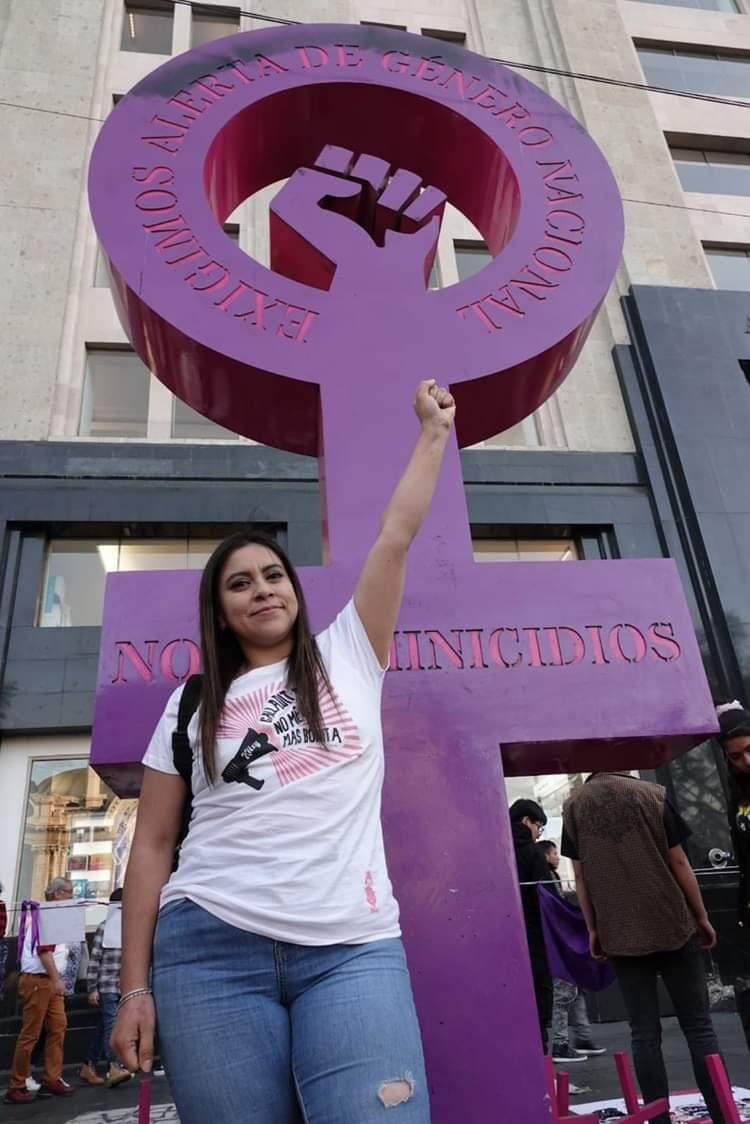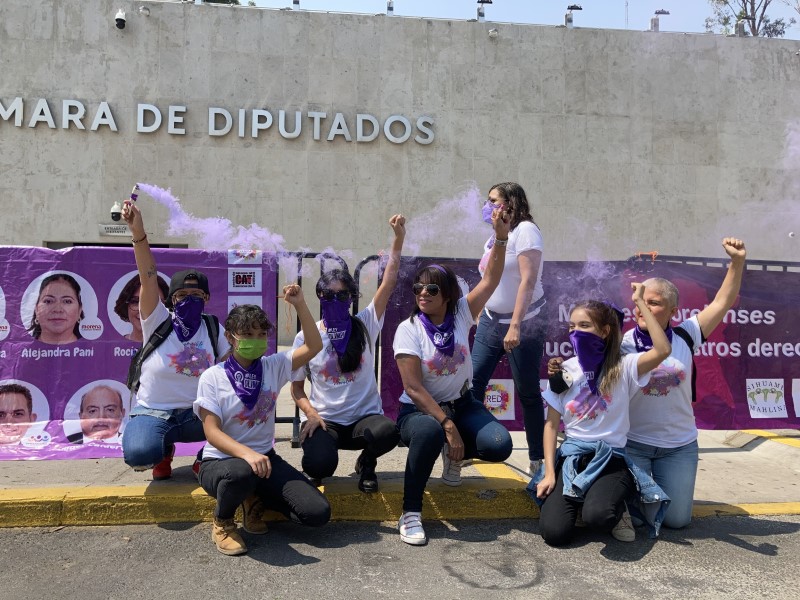Advancing gender equality in the digital age: Programs work to address technology-facilitated violence
When sex videos of her began circulating on the Internet, Olimpia Coral Melo Cruz felt disgusted, ashamed—and then angry.
Living in a small town in Mexico, the embarrassing comments the young woman received as the private images she’d shared with a former boyfriend went viral on “revenge porn” sites isolated her. “I stopped going to school,” recalls Melo Cruz, who contemplated suicide.
She tried to file a complaint that the images were publicized without her consent, but the country’s laws did not recognize that as a crime. Melo Cruz and other victims of online abuse founded a support group and fought for legal reform. After many years, Mexico enacted “Olimpia’s Law,” which recognizes and punishes digital violence. It also furthers public policy on the issue, which includes prevention, action and advocacy measures.

Olimpia Coral Melo Cruz, a victim of “revenge porn” who fought to change the law in Mexico, is founder of the National Front for Sorority, a group that speaks out against digital sexual violence.
CREDIT: Chumbera Producciones
Today, Melo Cruz speaks out about her ordeal as part of a global campaign called that fights image-based and other types of “technology-facilitated gender-based violence,” or TFGBV. Organized by the UNFPA, the UN sexual and reproductive health agency, and supported by 抖淫视频, the campaign is part of an international effort to raise awareness of the prevalence of and the need to address such harassment and abuse of women and girls around the world.
“The impacts are very, very real,” says Alexandra Robinson, the global gender-based violence technical advisor for UNFPA. While the issue and impacts aren’t new, she says, the organization began studying TFGBV in 2020, just as the world experienced a vast expansion of digital connectedness under the COVID-19 pandemic.
A technological double-edged sword
UNFPA, which supports GBV programming in 153 countries, as well as local advocacy groups on the ground have found that new technologies can offer opportunities to advance gender equality. They help to expand access to essential health information, services and education and give voice and power to marginalized groups, Robinson says. However, they can also be used to harass, attack and silence individuals. Phone apps and web platforms used to bring GBV programming to remote corners of the world can be “weaponized against women and girls,” perpetuating discrimination through sexualized and gendered threats and attacks, Robinson says. “It’s an incredibly fast-moving space.”
A global program by the UNFPA called Making All Spaces Safe is designed “to ensure that women and girls are safe and can flourish in all spaces they use and occupy,” including through technology and in online spaces. The organization has a demanding action to end digital violence and abuse.
A 2021 study of women in 51 countries by the Economist Intelligence Unit found that 38% of those with Internet access have personally experienced online violence, 63% know someone who has been subjected to it and 85% have witnessed online violence being perpetrated against another woman.
Through the research conducted by UNFPA, many types of TFGBV beyond image-based abuse have been identified, says Robinson. This includes doxing (the non-consensual disclosure of personal information), cyberstalking, sextortion, hacking, impersonation, using technology to locate individuals to perpetrate abuse and limiting or controlling people’s use of technology. TFGBV can include acts committed through any type of technology, including phones, GPS, drones and “smart” devices.

Alexandra Robinson is the global gender-based violence technical advisor for UNFPA, the UN sexual and reproductive health agency.
CREDIT: David Armstrong
Some of the harmful aspects of TFGBV include the anonymity and distance of offenders and the fact that they can largely act with impunity, Robinson says. It is also normalized, often because it’s perceived as less dangerous to victims. “And the offending images and words exist in perpetuity in online spaces and will never be erased, leaving survivors in fear.”
Robinson says victims can experience psychological distress and long-term mental health impacts. Many face economic insecurity, limited educational opportunities and political and social exclusion.
Public presence brings perils
A 2023 report in the United Kingdom noted that women are less confident about their online safety than men and feel less able to share opinions on the web. Robinson says women concerned about being targeted online often limit their digital interactions or disengage completely, which can deter them from participating in public life as journalists, politicians, academics and human-rights defenders.
Teenah Jutton, a member of the National Assembly of Mauritius, experienced first-hand the technological perils of being a public figure. After she was elected in 2019 as the youngest member of parliament in the island nation off the coast of Africa, manipulated degrading images and pornographic videos of her were circulated online through fake profiles.
“I was shattered, completely shattered. For a whole night I didn’t sleep,” recalls Jutton, especially because in her culture “a lady’s dignity is the most prized jewel.” Jutton decided to “transform that moment into a purpose,” and worked to change the law. The Cybersecurity and Cybercrime Act adopted in Mauritius in October 2021 makes it punishable by law to publish a post on social media with the malicious intent to cause harm, she says.

Teenah Jutton is a member of the National Assembly of Mauritius. She hopes her activism as well as wider global attention to the problem of TFGBV will encourage other young women to become active politically and fight against TFGBV.
Credit: Courtesy of Teenah Jutton
Jutton remembers her family initially trying to dissuade her from going into politics because “it is dirty”. She hopes her activism as well as wider global attention to the issue will encourage other young women to follow her lead.
“Standing alone we can make a little difference, but standing together we can move mountains,” adds Jutton. “The unbridled freedom that cyber platforms offer to those bent on harming innocent people means we must constantly introduce new safety controls, keep reinforcing and updating existing laws and explore the need to introduce new and sterner legislation.”
Suzie Dunn, a professor of law at Dalhousie University’s Schulich School of Law in Halifax, whose research includes TFGBV, notes that many women reconsider taking on public roles to avoid sexualized harassment.
“Women are losing their voices,” she says. “In more extreme cases, they just don’t engage in a public-facing Internet presence at all.”
Dunn notes the issue of TFGBV is especially prominent in low- and middle-income countries, given the early and rapid adoption of mobile phones there.
“Being able to access information and communicate with people has been a godsend in many ways. But once you bring technology in, it also increases the forms and the level of violence that people can experience,” she says. “When you have technology, it means that people can access you 24/7, people can harass you 24/7, people can stalk you 24/7. And there is a broader audience for people who are spreading misogynistic messages.”
Understanding the global reach of TFGBV
Dunn is first author of the report of a research project that is expected to be released in April by the Centre for International Governance Innovation (CIGI), a think tank in Waterloo, Ontario. The project is a global survey of TFGBV in 18 countries that CIGI started in early 2020, with support from the International Development Research Centre and 抖淫视频. The effort was expanded to an additional 15-plus countries in 2022.

Suzie Dunn, a professor of law at Dalhousie University’s Schulich School of Law, says that “women are losing their voices” online because of sexualized harassment.
Credit: Dalhousie University
Dunn says the report of the first round of research is intended to contextualize the issue of TFGBV, show what people internationally think about it and provide useful data for policy鈥憁akers and advocates country-by-country. It identifies 13 types of technology鈥慺acilitated harms and the impacts for women, gender-marginalized and LGBTQ2+ people, particularly in the Global South. It also provides recommendations for governments, technology companies, civil society organizations and academics to address the topic.
The key is to use a “human-rights based, equity-focused, trauma-informed, survivor-centric and intersectional feminist approach when dealing with these issues,” says Dunn. There are concerns, for example, that detrimental surveillance tactics could be used “under the guise of protecting women and children,” she explains.
Dunn says the second round of research that has begun provides opportunities for collaboration, educational development and input from experts on the ground, so that issues unique to each country being surveyed can be explored.
She says that “Canada in many ways has been a leader in this area” by investing in such research, joining international efforts and introducing legislation related to online harms at home. “It shows we’re taking this issue seriously.”
This includes the work of 抖淫视频’s Digital Inclusion Lab, which focuses on the intersection of technology and foreign policy, Dunn notes. Canada has also developed “norm-setting” documents and undertaken initiatives to promote civic participation and safety online. These include a Playbook for Gender Equality in the Digital Age, which sets out best practices to support gender equality in digital contexts, and Guidelines on Supporting Human Rights Defenders, which promote an online environment conducive to civic participation.
As 2022 chair of the , Canada committed to working with its partners to address online gender-based violence through research and advocacy efforts. Also in 2022, Canada joined the , a coalition that aims to prioritize, understand, prevent and address TFGBV.

A group gathers outside of Mexico’s Chamber of Representatives on April 29, 2021, to mark the passing of “Olimpia’s Law,” which makes it a crime to take and distribute images of intimate and sexual content without the consent of the person involved.
Credit: Chumbera Producciones
“Of course, like every other country, I think that we have a lot more work to do,” Dunn says, especially as this is a new issue “and we’re still learning a lot.” The evolution of technology is worrying, she remarks. For example, new home-security systems and Internet of Things devices such as remote home-heating systems and video doorbells can be controlled or used for spying by abusive partners.
However, these technologies at root are “just a platform for existing misogyny,” she comments. “What we need to be doing primarily is educating people about healthy behaviours and avoiding misogyny.”
Raising awareness, finding solutions
Some interesting technological solutions have been introduced, Dunn notes, such as dating apps that blur out nude images. There are blocking functions and privacy settings on social media, albeit “abusive people will find ways around those,” she adds.
Alexandra Robinson says raising awareness is a critical part of initiatives such as UNFPA’s bodyright campaign. She notes that enhancing the visibility of TFGBV could empower survivors to voice their experiences and increase government investment in capacity building for front line providers. For example, social workers involved in domestic violence cases could be trained to look for spyware on the phones of abuse victims or tracking devices in their belongings.
She says the UNFPA is launching a guidance on the safe and ethical design and use of technology for GBV and harmful practices interventions. This includes incorporating threat鈥憁odelling, ensuring there is safety and privacy “by design” and putting women and women-centric concerns at the core of the development process, she says. “We’re hoping that we can influence industry standards.”
Olimpia Coral Melo Cruz calls for governments and tech companies to extend their focus beyond cybercrimes that involve economic loss to those that “damage the integrity and privacy of individuals.”
She says fighting back against the online abuse she suffered has taken away her concerns about exposing her name, her body and her life—as well as her fear of navigating the web.
“We have the right to be safe in digital spaces and to build an Internet that above all protects our security and respects our human rights,” Melo Cruz adds. “Even if you can’t see it or touch it, the virtual realm is real.”
- Date modified:
